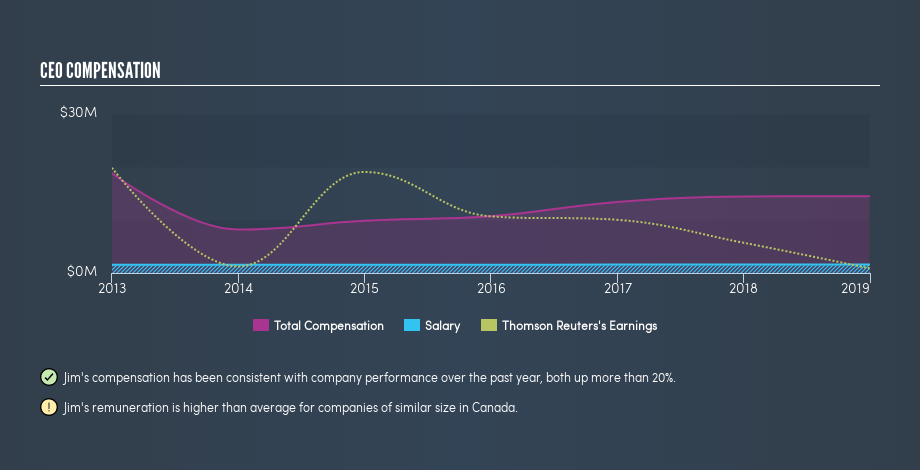Should You Worry About Thomson Reuters Corporation's (TSE:TRI) CEO Salary Level?

Jim Smith has been the CEO of Thomson Reuters Corporation (TSE:TRI) since 2012. First, this article will compare CEO compensation with compensation at other large companies. After that, we will consider the growth in the business. And finally we will reflect on how common stockholders have fared in the last few years, as a secondary measure of performance. The aim of all this is to consider the appropriateness of CEO pay levels.
Check out our latest analysis for Thomson Reuters
How Does Jim Smith's Compensation Compare With Similar Sized Companies?
According to our data, Thomson Reuters Corporation has a market capitalization of CA$45b, and pays its CEO total annual compensation worth US$14m. (This number is for the twelve months until December 2018). While we always look at total compensation first, we note that the salary component is less, at US$1.6m. We looked at a group of companies with market capitalizations over US$8.0b and the median CEO total compensation was US$7.0m. There aren't very many mega-cap companies, so we had to take a wide range to get a meaningful comparison figure.
Thus we can conclude that Jim Smith receives more in total compensation than the median of a group of large companies in the same market as Thomson Reuters Corporation. However, this doesn't necessarily mean the pay is too high. We can get a better idea of how generous the pay is by looking at the performance of the underlying business.
The graphic below shows how CEO compensation at Thomson Reuters has changed from year to year.
Is Thomson Reuters Corporation Growing?
Over the last three years Thomson Reuters Corporation has shrunk its earnings per share by an average of 40% per year (measured with a line of best fit). It achieved revenue growth of 6.4% over the last year.
Few shareholders would be pleased to read that earnings per share are lower over three years. And the modest revenue growth over 12 months isn't much comfort against the reduced earnings per share. It's hard to argue the company is firing on all cylinders, so shareholders might be averse to high CEO remuneration. You might want to check this free visual report on analyst forecasts for future earnings.
Has Thomson Reuters Corporation Been A Good Investment?
I think that the total shareholder return of 64%, over three years, would leave most Thomson Reuters Corporation shareholders smiling. So they may not be at all concerned if the CEO were to be paid more than is normal for companies around the same size.
In Summary...
We examined the amount Thomson Reuters Corporation pays its CEO, and compared it to the amount paid by other large companies. We found that it pays well over the median amount paid in the benchmark group.
Earnings per share have not grown in three years, and the revenue growth fails to impress us.
On the other hand, returns have been good, so the company is doing something right. Given this situation we doubt shareholders are particularly concerned about the CEO compensation. So you may want to check if insiders are buying Thomson Reuters shares with their own money (free access).
Important note: Thomson Reuters may not be the best stock to buy. You might find something better in this list of interesting companies with high ROE and low debt.
We aim to bring you long-term focused research analysis driven by fundamental data. Note that our analysis may not factor in the latest price-sensitive company announcements or qualitative material.
If you spot an error that warrants correction, please contact the editor at editorial-team@simplywallst.com. This article by Simply Wall St is general in nature. It does not constitute a recommendation to buy or sell any stock, and does not take account of your objectives, or your financial situation. Simply Wall St has no position in the stocks mentioned. Thank you for reading.

